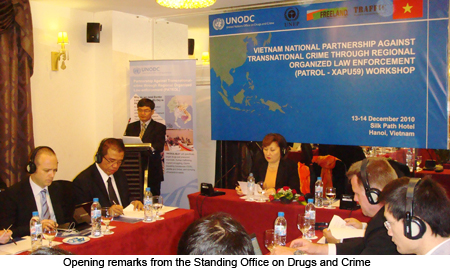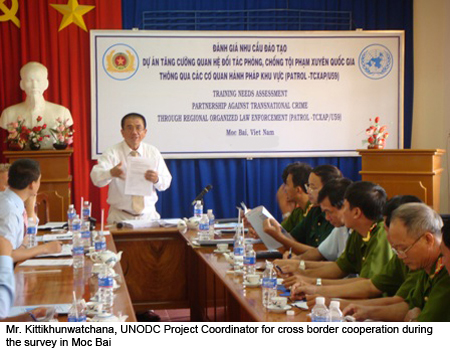Viet Nam strengthens inter-agency response to border crimes

Hanoi (Viet Nam), 26 January 2011 - The extensive nature of Viet Nam's border areas make it very difficult for the authorities to effectively control them. Criminal networks recognize this and use porous borders to smuggle commodities and human beings from Viet Nam to Cambodia, China and the People's Democratic Republic of Lao and vice versa. To make things worse, the range of commodities that are smuggled in South-East Asia, human beings, drugs, timber, wildlife, counterfeit medicines and hazardous waste, frequently overwhelms specialized enforcement agencies limited in operational capacity. Thus, cooperation among enforcement agencies within and across borders becomes of paramount importance to mount an effective response to criminal activities at the border.
From 13 to 14 December 2010, the Standing Office on Drugs and Crime of the Ministry of Public Security and UNODC, with the support the Freeland foundation, the wildlife trade monitoring network TRAFFIC and the United Nations Environment Programme, jointly organized a workshop with the objective to strengthen inter-agency cooperation at the border among enforcement agencies and with neighboring countries.
The workshop was held as part of UNODC project on Partnership Against Transnational-crime through Regional Organized Law-enforcement
(PATROL).

During the workshop, UNODC presented the findings of a recent survey conducted along some border areas of Viet Nam. "Border officers in Viet Nam still perceive the trafficking of drugs as the most serious form of cross-border illegal activities" said Mr. Giovanni Broussard from UNODC. "Nonetheless, they recognize that other forms of crime are posing severe threats to security and development".
According to a UNODC conducted
survey 73 per cent of the interviewed officers think that illegal migrants cross the borders with the help of human smugglers. Moreover, the trafficking of women for sexual exploitation is perceived as the most common form of human trafficking, especially in the northern part of the country. Finally, the smuggling of protected wildlife species - notably snakes, turtles, monitor lizards and pangolins - is considered a serious and profitable form of cross-border crime.
At the end the meeting, participants agreed on the need to establish an inter-agency committee to assess progress and threats to effective cross-border cooperation. The committee will comprise senior officials from the Ministry of Public Security, the Border Army, Viet Nam Customs and the Ministry of Agriculture and Rural Development. The first of the two meetings is scheduled to take place in May 2011.

